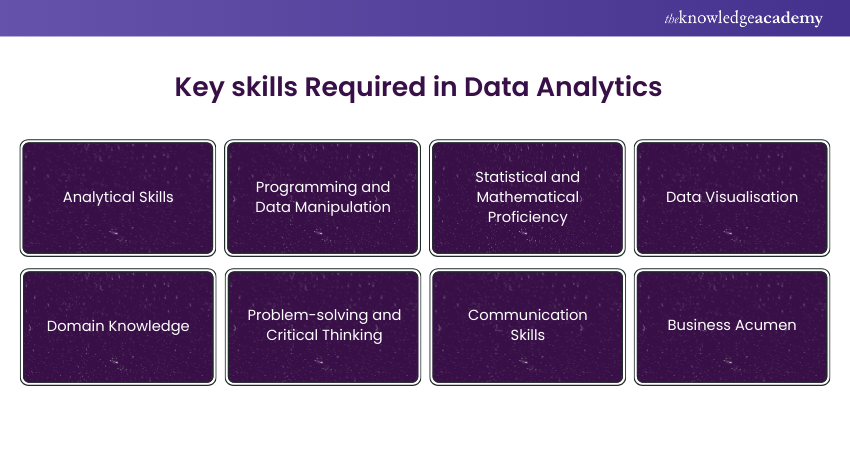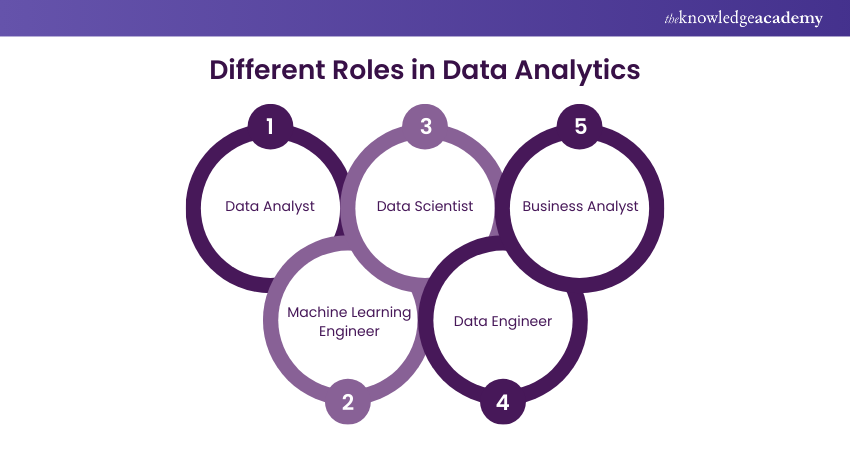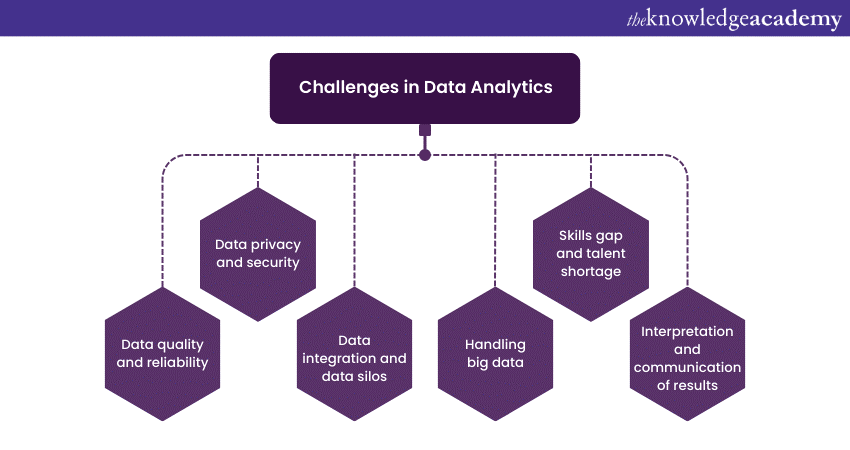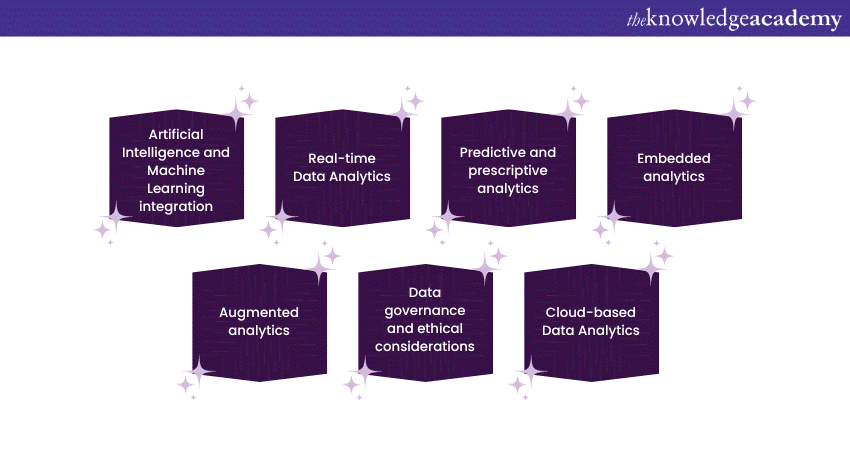We may not have the course you’re looking for. If you enquire or give us a call on + 1-866 272 8822 and speak to our training experts, we may still be able to help with your training requirements.
Training Outcomes Within Your Budget!
We ensure quality, budget-alignment, and timely delivery by our expert instructors.

Imagine a world where every click, purchase, and interaction generates valuable data that can shape the future. Data Analytics transforms this raw data into meaningful insights, driving informed decision-making across various sectors. This brings a world of opportunities and raises the question: "Is Data Analytics a Good Career?"
According to Statista, the data generated globally is projected to exceed 180 zettabytes by 2025. The ability to extract and interpret this massive amount of data is highly sought after, making Data Analytics a promising career choice. So, if you are asking, "Is Data Analytics a Good Career?" this blog explores the benefits, challenges, and opportunities in this exciting field to help you decide.
Table of Contents
1) Data Analytics and Its Rise
2) Why Data Analytics as a Career?
3) Key Skills Required in Data Analytics
4) Different Roles in Data Analytics
5) Challenges and Future Trends in Data Analytics
6) Conclusion
Data Analytics and Its Rise
The digital revolution has led to a wider acceptance of data across industries, making it critical to derive insights and valuable information from this massive trove of raw data., making it critical to derive insights and valuable information from this massive trove of raw data. Data Analytics empowers organisations to extract actionable intelligence, enabling them to make well-informed decisions and gain a competitive edge in the market. As businesses recognise the significance of Data Analytics, the demand for skilled professionals in this field has skyrocketed.
Data Analytics has experienced remarkable growth and has become an indispensable part of modern businesses. Companies leverage Data Analytics to optimise operations, enhance customer experiences, improve products and services, and drive innovation. The increasing adoption of data-driven strategies has paved the way for numerous career opportunities for aspiring data analysts and data scientists.
A career in Data Analytics generally requires a strong educational foundation in a related field such as computer science, statistics, mathematics, or engineering. Many professionals also opt for specialised Data Analytics courses or certifications to enhance their skills and credibility in the job market. The Data Analytics career path offers ample opportunities for growth and progression. As professionals gain experience and expertise, they can move up the career ladder from entry-level Data Analysts to senior Data Scientists, data team leaders, or Data Analytics consultants.

Why Data Analytics as a Career?
A career in Data Analytics is a rewarding journey, where uncovering valuable insights from vast datasets fuels informed decision-making and drives business success. Here are the reasons highlighting the Importance of Data Analytics and why it is an enticing career choice, offering endless opportunities for growth and impact.
1) Increasing Demand and C
Data Analytics is witnessing unprecedented demand across industries such as finance, healthcare, e-commerce, Big Data Marketing, and more. As businesses embrace data-driven decision-making, they require skilled professionals with the ability to analyse and interpret data and provide actionable insights. This high demand translates into a wealth of career opportunities for individuals with an eye for data and a flair for problem-solving.
2) Versatility and Industry Relevance
One of the key reasons to consider Data Analytics as a career is its versatility. Data Analytics is not limited to any specific industry; it finds applications in nearly every sector. From retail and finance to healthcare and government, Data Analytics plays a pivotal role in driving efficiency and innovation. This versatility allows professionals to explore various domains and find exciting and challenging roles that align with their interests.
3) Lucrative Salary Prospects
The demand for Data Analytics professionals has led to attractive salary packages and competitive compensation. Skilled Data Analysts and data scientists are in high demand, making them eligible for rewarding and well-paid positions within organisations. As professionals gain experience and expertise, their earning potential further increases.
4) Continuous Learning and Skill Development
Data Analytics is a fast-evolving-field, with new technologies, tools, and methodologies emerging regularly. Pursuing a career in Data Analytics ensures continuous learning and skill development, making it an intellectually stimulating and progressive profession. This dynamic nature keeps professionals engaged and updated with the latest trends and advancements in the industry.
5) Impactful Decision-making
Data Analytics drives data-informed decision-making, which can have a significant impact on an organisation's success. As a Data Analyst or Data Scientist, you will have the opportunity to influence crucial business decisions, solve complex challenges, and contribute to the overall growth and efficiency of the company.
Unlock the world of data-driven insights with our comprehensive Data Science Analytics Course and accelerate your career in the digital era.
Key skills Required in Data Analytics

Data Analytics is a multidisciplinary field that empowers organisations to extract valuable insights from vast and complex datasets. To succeed in this dynamic and data-driven domain, professionals must possess a diverse set of key skills. These skills not only enable Data Analysts and data scientists to navigate through mountains of data but also help them draw meaningful conclusions and make data-informed decisions. Let's delve into the essential skills required in Data Analytics and understand how each plays a pivotal role in the process.
1) Analytical Skills
At the core of Data Analytics lies the ability to analyse data effectively. Analytical skills encompass the capacity to examine data, identify patterns, and draw meaningful conclusions. Data analysts need to be curious and have a keen eye for detail to uncover insights that drive decision-making. By employing analytical skills, professionals can make data-driven recommendations that lead to increased efficiency and optimised processes.
2) Programming and Data Manipulation
Proficiency in programming languages is a fundamental requirement in Data Analytics. Popular programming languages like Python, R, SQL, and others enable Data Analysts to manipulate and process data efficiently. With programming skills, professionals can clean and prepare raw data for analysis, extract relevant information, and perform complex calculations. Programming also facilitates automation, streamlining repetitive tasks and accelerating data processing.
3) Statistical and Mathematical Proficiency
Data Analytics involves applying statistical methods and mathematical models to make sense of data. A strong foundation in statistics is crucial for accurate analysis and interpretation. Data Analysts use statistical techniques to derive meaningful insights, perform hypothesis testing, and validate findings. Additionally, mathematical proficiency allows professionals to create predictive models, perform regression analysis, and make data-driven predictions.
4) Data Visualisation
Data Visualisation is the art of presenting complex data in a visual and easy to understand format. Effective data visualisation enables stakeholders to grasp information quickly and draw insights immediately. Data Analysts utilise visualisation tools and techniques to create charts, graphs, and interactive dashboards that communicate key findings effectively. By transforming raw data into visually compelling representations, professionals can communicate insights to non-technical audiences more efficiently.
5) Domain Knowledge
In Data Analytics, domain knowledge refers to a deep understanding of the industry or sector in which Data Analysts operate. Domain knowledge enables analysts to contextualise data and interpret findings in a meaningful business context. Understanding industry-specific metrics, KPIs, and challenges helps Data Analysts identify relevant trends and opportunities. By combining domain knowledge with Data Analysis, professionals can provide data-informed recommendations that drive business growth and optimisation.
6) Problem-solving and Critical Thinking
Data Analytics involves solving complex problems and making data-driven decisions. Problem-solving and critical thinking skills are vital in identifying the most appropriate analytical approaches and techniques for specific challenges. Data Analysts often encounter unstructured data and ambiguous questions, requiring creative problem-solving abilities to navigate through uncertainties and find solutions.
7) Communication Skills
Effective communication is paramount in Data Analytics, as professionals need to convey insights and findings to stakeholders across the organisation. Data Analysts must communicate complex technical concepts in a lucid and understandable fashion to non-technical audiences. Strong communication skills aid in building trust and credibility, ensuring that data-driven insights are understood and acted upon at every level of the organisational hierarchy.
8) Business Acumen
Data Analysts must possess a good understanding of the business objectives and strategies. This business acumen helps data professionals align their analyses with the organisation's goals and objectives. By understanding the bigger picture, Data Analysts can focus on delivering insights that directly impact business performance and contribute to the organisation's success.
Master the art of handling Big Data with our industry-leading Big Data Analysis Course and gain a competitive edge in the data-driven landscape.
Different Roles in Data Analytics
Data Analytics offers a diverse range of roles for individuals with different skill sets and interests. Here are some of the key roles in Data Analytics:

1) Data Analyst: Data Analysts focus on collecting, cleaning, and analysing data to derive insights and support decision-making processes.
2) Data Scientist: Data Scientists are data experts with advanced analytical and machine learning skills. They build predictive models and develop algorithms to solve complex business problems.
3) Business Analyst: Business Analysts bring together Data Analytics and business strategy. They translate data insights into actionable recommendations for business growth and optimisation.
4) Machine Learning Engineer: Machine Learning Engineers specialise in developing and deploying Machine Learning models that automate processes and improve system performance.
5) Data Engineer: Data Engineers design and maintain data pipelines and databases, ensuring data is collected, stored, and processed efficiently.
Challenges and Future Trends in Data Analytics
Data Analytics helps businesses to harness the potential of data and gain valuable insights. However, as the volume and complexity of data grows exponentially, Data Analytics faces a multitude of challenges that need to be addressed to ensure its effectiveness and relevance. Additionally, the field of Data Analytics is a constant evolutionary arc, with new technologies and trends shaping its future landscape. In this section, we will explore some of the significant challenges faced in Data Analytics and discuss the future trends that are likely to shape the industry.
The challenges in Data Analytics can be broadly classified into the following sections:

1) Data Quality and Reliability
Data quality remains a critical challenge in Data Analytics. As organisations accumulate vast amounts of data from various sources, ensuring the accuracy, completeness, and reliability of the data becomes paramount. Inaccurate and incomplete data can lead to erroneous analyses and misleading insights, undermining the value of Data Analytics efforts.
2) Data Privacy and Security
With the increasing reliance on Data Analytics, ensuring data privacy and security has become a significant concern. Handling sensitive and confidential information demands robust data protection measures to prevent data breaches and unauthorised access. Striking a balance between data accessibility for analysis and safeguarding individuals' privacy remains a complex challenge.
3) Data Integration and Data Silos
Many organisations face the challenge of integrating data from disparate sources. Data silos, where data storage is done in isolated systems or departments, hinder the holistic view of the organisation's data. Data integration is vital to unlocking the full potential of Data Analytics by enabling comprehensive and cohesive analyses.
4) Handling Big Data
The sheer volume of data generated daily poses a challenge for Data Analytics. Processing and analysing Big Data require scalable and high-performance computing infrastructure. Implementing big data technologies and frameworks is crucial to managing and analysing large datasets effectively.
5) Skills Gap and Talent Shortage
The field of Data Analytics demands skilled professionals who possess a diverse skill set, including Data Analysis, programming, statistics, and domain knowledge. There is continuously increasing demand for Data Analysts and Data Scientists, which has led to a shortage of talent with the necessary expertise, resulting in a skills gap.
6) Interpretation and Communication of Results
Obtaining valuable insights from data is just the first step; communicating those insights effectively to stakeholders is equally important. Data Analysts must be adept at presenting complex analyses in a clear and understandable manner to facilitate data-informed decision-making across the organisation.
Level up your Data Analytics skills with our hands-on Data Analytics with R Course and harness the power of R for insightful data-driven decisions.
The future trends in Data Analytics lie in the following fields:

1) Artificial Intelligence and Machine Learning Integration
Artificial intelligence (AI) and Machine learning (ML) being integrated into Data Analytics is a significant trend shaping the future of the field. AI and ML algorithms can analyse vast datasets, identify patterns, and make predictions with unparalleled accuracy and speed. The combination of Data Analytics and AI/ML will enable more advanced and automated data-driven decision-making processes.
2) Real-time Data Analytics
As the need for real-time insights grows, real-time Data Analytics will become more prevalent. Organisations will seek to analyse data as it is generated, allowing them to respond quickly to changing market conditions and customer preferences.
3) Predictive and Prescriptive Analytics
Predictive and prescriptive analytics will gain prominence, going beyond descriptive analytics that provides insights into past events. Predictive analytics uses historical data to make informed predictions about future outcomes, while prescriptive analytics suggests optimal actions to achieve specific goals.
4) Embedded Analytics
Embedded analytics involves integrating Data Analytics capabilities directly into applications and business processes. This trend will enable end-users to access and utilise Data Analytics without the need for specialised data analysts, democratising data insights across the organisation.
5) Augmented Analytics
Augmented analytics leverages AI and ML to enhance the capabilities of Data Analysts. It automates data preparation, visualisation, and insights generation, making Data Analytics more accessible to non-technical users.
6) Data Governance and Ethical Considerations
With data privacy and ethical concerns gaining prominence, data governance practices will become more stringent. Organisations will focus on ensuring compliance with data regulations and fostering responsible data use.
7) Cloud-based Data Analytics
Cloud-based Data Analytics solutions will continue to gain popularity due to their scalability, flexibility, and cost-effectiveness. Cloud platforms offer the infrastructure required to process and analyse big data without significant upfront investments.
Elevate your Data Analytics expertise with our Advanced Data Analytics Certification Course and excel in today's data-driven world.
Conclusion
Data Analytics is undeniably a good career choice for individuals seeking a dynamic and impactful profession. With its increasing demand, lucrative salary prospects, versatility, and opportunities for continuous learning, Data Analytics offers a rewarding and fulfilling career path. Aspiring data professionals can look forward to making a difference by providing data-driven insights that shape the future of businesses and industries. With the right skills, dedication, and passion for data, a career in Data Analytics holds immense potential for personal and professional growth. So, if you are curious, analytical, and eager to unlock the power of data, the question of Is Data Analytics a Good Career might have an obvious answer for you.
Empower your team with our cutting-edge Big Data and Analytics Training to unlock transformative insights and stay ahead in the data-driven era.
Frequently Asked Questions

The increasing volume of data and the continuing integration of advanced technologies like Machine Learning and AI are amplifying the need for skilled Data Analysts across industries.

While AI can automate certain tasks traditionally performed by Data Analysts (such as data cleaning and preliminary analysis), it's unlikely to replace the need for human Data Analysts fully. Data Analysts contribute, contextual understanding, strategic insight, and creative problem-solving that AI currently cannot emulate.

The Knowledge Academy takes global learning to new heights, offering over 30,000 online courses across 490+ locations in 220 countries. This expansive reach ensures accessibility and convenience for learners worldwide.
Alongside our diverse Online Course Catalogue, encompassing 17 major categories, we go the extra mile by providing a plethora of free educational Online Resources like News updates, Blogs, videos, webinars, and interview questions. Tailoring learning experiences further, professionals can maximise value with customisable Course Bundles of TKA.

The Knowledge Academy’s Knowledge Pass, a prepaid voucher, adds another layer of flexibility, allowing course bookings over a 12-month period. Join us on a journey where education knows no bounds.

The Knowledge Academy offers various Big Data and Analytics Trainings, including the Big Data Analysis Course, Data Science Analytics Training, and Big Data Architecture Training. These courses cater to different skill levels, providing comprehensive insights into the Types of Data in Statistics.
Our Data, Analytics & AI Blogs cover a range of topics related to Big Data Analytics, offering valuable resources, best practices, and industry insights. Whether you are a beginner or looking to advance your Data Analytics skills, The Knowledge Academy's diverse courses and informative blogs have got you covered.
Upcoming Data, Analytics & AI Resources Batches & Dates
Date
 Advanced Data Analytics Course
Advanced Data Analytics Course
Mon 6th Jan 2025
Mon 3rd Mar 2025
Mon 19th May 2025
Mon 21st Jul 2025
Mon 8th Sep 2025
Mon 10th Nov 2025
Mon 24th Nov 2025
Mon 8th Dec 2025







 Top Rated Course
Top Rated Course


 If you wish to make any changes to your course, please
If you wish to make any changes to your course, please


